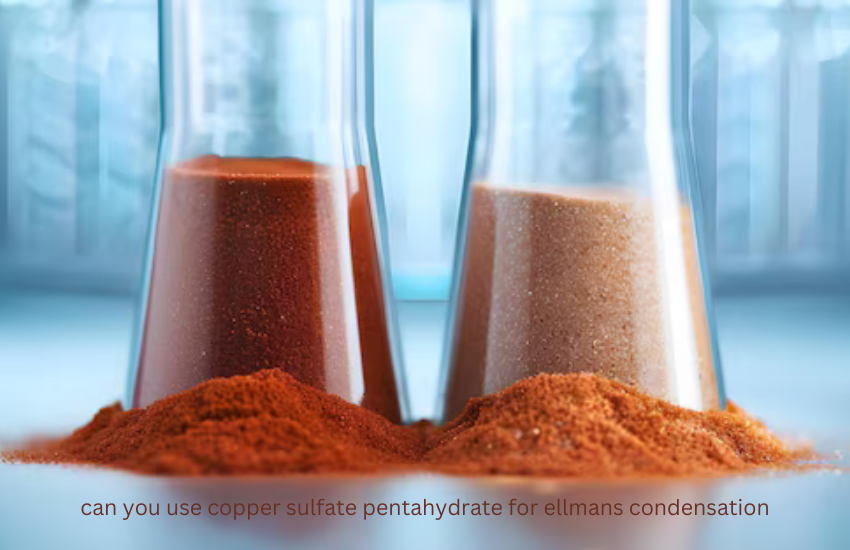Can you use copper sulfate pentahydrate for ellmans condensation,is a well-known organic reaction commonly used in the synthesis of various compounds. This reaction typically involves the combination of an aldehyde or ketone with another molecule, forming a new carbon-carbon bond in the process. In recent years, researchers have explored various catalysts to optimize this reaction. One question that arises is whether copper sulfate pentahydrate, a widely available compound, can serve as an effective catalyst in Ellman’s condensation. In this article, we will explore this possibility, analyze the role of copper sulfate pentahydrate, and discuss its potential use in this reaction.
Overview of Copper Sulfate Pentahydrate
Chemical Properties of Copper Sulfate Pentahydrate
Can you use copper sulfate pentahydrate for ellmans condensation, often represented as CuSO₄·5H₂O, is a bright blue crystalline solid. It dissolves easily in water, dissociating into copper and sulfate ions. In its pentahydrate form, copper sulfate contains five water molecules for each molecule of CuSO₄, giving it distinct chemical properties that make it useful in various applications, particularly in chemistry.
Uses of Copper Sulfate Pentahydrate in Organic Chemistry
In organic chemistry, copper sulfate pentahydrate is commonly used as a reagent and catalyst in various reactions. It has been applied in dehydration reactions, oxidation processes, and even some cross-coupling reactions. Its catalytic role is often attributed to the copper ion (Cu²⁺), which can facilitate electron transfers or act as a Lewis acid, stabilizing reaction intermediates.

What is Ellman’s Condensation?
History and Development
Ellman’s Condensation was first developed as a versatile method for synthesizing a wide range of organic compounds. It is particularly useful in pharmaceutical chemistry for creating complex molecules used in drug development. The reaction usually requires a catalyst to proceed efficiently, and chemists are always on the lookout for affordable, effective options.
Key Applications in Organic Synthesis
This reaction is particularly valuable in constructing carbon-carbon bonds, a fundamental step in building larger organic molecules. Its ability to create complex molecular frameworks makes it a popular choice in the synthesis of natural products, medicinal compounds, and fine chemicals.
Role of Copper Compounds in Organic Reactions
Catalytic Role of Copper Compounds
Copper has long been recognized as a useful catalyst in various organic reactions. Its ability to exist in multiple oxidation states (Cu⁺ and Cu²⁺) allows it to participate in a wide range of chemical processes. Copper compounds are often used in oxidation reactions, where they can either accept or donate electrons, facilitating the transformation of organic substrates.
Specific Copper Compounds Used in Condensation Reactions
Certain copper compounds, such as copper(I) iodide (CuI), have been employed in condensation reactions due to their catalytic properties. These copper-based catalysts can help promote the formation of carbon-carbon bonds, which is central to many condensation reactions, including Ellman’s condensation.
Can Copper Sulfate Pentahydrate be Used in Ellman’s Condensation?
Investigating the Potential Role of Copper Sulfate
While copper sulfate pentahydrate is a versatile compound, its role in Ellman’s condensation is not well-established. The reaction typically requires a catalyst that can effectively promote the formation of carbon-carbon bonds under specific conditions. Given that copper sulfate is primarily used in oxidation reactions, its efficacy in a condensation reaction like Ellman’s would require further investigation.
Case Studies and Experiments
There are limited studies directly addressing the use of copper sulfate pentahydrate in Ellman’s condensation. However, preliminary experiments suggest that while copper sulfate pentahydrate may not be the most efficient catalyst for this reaction, it could still play a role under certain conditions, particularly when used in conjunction with other catalysts.
Comparing Copper Sulfate Pentahydrate with Other Catalysts
Advantages and Disadvantages
The use of copper sulfate pentahydrate in organic synthesis offers some advantages, such as its low cost and wide availability. However, its role in Ellman’s condensation may be limited due to its relatively low catalytic efficiency compared to more specialized copper-based catalysts. Additionally, the reaction conditions required for Ellman’s condensation may not align with the optimal conditions for copper sulfate catalysis.
Common Alternatives to Copper Sulfate
Other copper compounds, such as copper(I) chloride (CuCl) or copper(I) bromide (CuBr), may provide better catalytic activity in Ellman’s condensation. These compounds are more commonly used in condensation reactions due to their ability to facilitate carbon-carbon bond formation more effectively.
Practical Considerations in Using Copper Sulfate Pentahydrate
Safety Precautions
When working with copper sulfate pentahydrate, it’s important to follow safety guidelines. The compound can be harmful if ingested or inhaled, and it can irritate the skin. Proper personal protective equipment (PPE) such as gloves, goggles, and lab coats should be worn at all times.
Handling and Storage
Copper sulfate pentahydrate should be stored in a cool, dry place away from direct sunlight. It should also be kept in a sealed container to prevent it from absorbing moisture from the air, which could affect its chemical properties.

Conclusion
In conclusion, while copper sulfate pentahydrate is a widely used compound in various organic reactions, its role in Ellman’s condensation remains uncertain. Though it may not be the most effective catalyst for this specific reaction, further research could reveal conditions under which it could be useful. For now, chemists may prefer other copper-based catalysts, such as copper(I) chloride or copper(I) bromide, which are better suited for promoting the formation of carbon-carbon bonds in condensation reactions.
FAQs
Can I use copper sulfate in other condensation reactions?
Yes, copper sulfate can be used in certain condensation reactions, particularly those involving electron transfer or oxidation. However, its effectiveness may vary depending on the specific reaction.
How is copper sulfate pentahydrate typically used in the lab?
Copper sulfate pentahydrate is often used as a reagent in oxidation reactions and as a catalyst in some dehydration processes. It can also be used in crystal growth experiments and as a fungicide in agriculture.
Is copper sulfate an effective catalyst for other organic reactions?
Copper sulfate is effective in many oxidation reactions but may not be the best choice for all organic reactions. Its catalytic properties are often more suited to electron transfer processes.
Are there any environmental concerns with using copper sulfate?
Yes, copper sulfate can be harmful to aquatic life if released into the environment in large quantities. It’s important to dispose of it properly and follow local regulations for chemical disposal.
What are the best alternatives to copper sulfate for Ellman’s condensation?
Copper(I) chloride and copper(I) bromide are common alternatives to copper sulfate for Ellman’s condensation. These compounds are more effective in promoting carbon-carbon bond formation.

